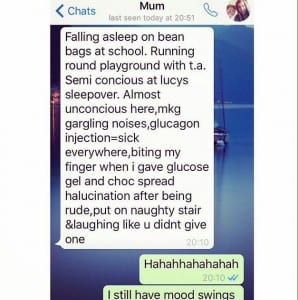 Due to living around 145 miles which works out at around 2 and half hours, away from the most important people in my life, who gave me life- my parents. I couldn’t record my mum’s voice personally and ask her questions about what it is like living with a daughter who has had type 1 diabetes since the age of 6. It must be hard for a parent having to learn about a condition that they never thought they’d have to deal with, especially my parents as no one in my family has ever had type 1 diabetes (which is strange to tell people as type 1 is genetic). As I’ve become more independent and moved away from home to university my parents have to put complete trust in me to cope myself and keep my health in check. Obviously my mum texts me most days to see how i am and if i have any health problems i tell her for example if she asks how my day’s been and i respond by saying I’ve been asleep most of the day due to having high blood glucose levels. As well as having her on the phone to the Ipswich diabetes centre team like in January when i was waking up hypo every morning, my mum was scared for my health and I nearly had to go home just so she could look after me and not have to worry i may fall hypo in the night and not wake up. It can be scary. Due to my parents also not being able to come watch my performance at 9.30am on May 17th i want to in some way include them in my piece, as i have been interested in different people’s perceptions. So i asked my mum to sum up how it feels to be a parent with a daughter with type 1 diabetes…
Due to living around 145 miles which works out at around 2 and half hours, away from the most important people in my life, who gave me life- my parents. I couldn’t record my mum’s voice personally and ask her questions about what it is like living with a daughter who has had type 1 diabetes since the age of 6. It must be hard for a parent having to learn about a condition that they never thought they’d have to deal with, especially my parents as no one in my family has ever had type 1 diabetes (which is strange to tell people as type 1 is genetic). As I’ve become more independent and moved away from home to university my parents have to put complete trust in me to cope myself and keep my health in check. Obviously my mum texts me most days to see how i am and if i have any health problems i tell her for example if she asks how my day’s been and i respond by saying I’ve been asleep most of the day due to having high blood glucose levels. As well as having her on the phone to the Ipswich diabetes centre team like in January when i was waking up hypo every morning, my mum was scared for my health and I nearly had to go home just so she could look after me and not have to worry i may fall hypo in the night and not wake up. It can be scary. Due to my parents also not being able to come watch my performance at 9.30am on May 17th i want to in some way include them in my piece, as i have been interested in different people’s perceptions. So i asked my mum to sum up how it feels to be a parent with a daughter with type 1 diabetes…
Living with a diabetic daughter
Finding out that my daughter, Laura had type 1 diabetes at the age of 6 was the start of an emotional rollercoaster journey, which never seems to end as a parent. I remember, as if it was yesterday, that finding out there was a reason why Laura had rapidly lost weight over a weekend felt somehow reassuring. That was until I started learning about type 1 diabetes. It was a daunting feeling to leave the hospital not having a clue what to give her to eat and drink and how on earth we would keep her healthy. Overnight we found ourselves requiring twice daily support from the diabetes nurse specialist at the hospital. We checked Laura’s blood glucose levels, pricking her finger with a spring loaded device, whilst a small machine read her levels, then we were advised, over the phone, how much insulin to inject her with, prior to feeding her.- makes me sound like some kind of animal/ experiment Even worse was the helpless feeling of having to explain to the school, family and friends how to look after Laura’s needs when I had no clue myself. Needing to clarify food plans and mealtimes at parties before deciding whether I needed to supply her own food and stay to look after her. Seeing the glazed looks in peoples’ eyes as they appeared to view me as a paranoid, over protective mum. Hearing the naïve comments about how she obviously ate too may sweets, cakes, sugary foods, that’s why she had diabetes. Seeing the glances, as I sat in a public place, drawing up her insulin, using a hypodermic syringe and injected into her leg, arm or backside, like I was some sort of “druggy” parent. It was a mammoth task working out how much insulin she needed taking account of her blood glucose level, any planned/unplanned activity, what she would be eating and drinking and when. Followed by the occasional panic I felt when she had her injection, then refused to eat, fearing a severe “hypo”. Trying desperately to get her to eat whilst resisting the temptation to force feed her. I remember too, the frustration at preparing a meal which Laura would only eat a small portion of before being full up and refusing to eat more, only to crave food a short while later. Then there was the constant drinking followed by the urgent, regular need to visit the toilet. Then there was the regular lethargy and complaints that her legs hurt, she was tired, thirsty, hungry. It took a while to understand and come to terms with the fact that Laura would spend the rest of her life juggling with a number of factors: namely blood glucose levels, food and drink intakes, timing of her meals, carrying diabetic supplies and snacks, exercise levels, room temperatures, insulin doses not to mention everyday stresses and anxieties. It took me around 2 years to accept that no matter how hard I tried and how many eventualities I covered, I would not and could not always get the insulin levels right. I could not keep her blood glucose levels perfect, nor anywhere near perfect. That’s hard to accept as a parent-If I couldn’t get it right, then who could? Apart from the wonderful staff at the Diabetes Centre of course. They are truly amazing and have been alongside us throughout our lengthy, ongoing rollercoaster journey. Their support and advice is as available and valuable to us now as it was on diagnosis day back in July 2001. The lifestyle factors and issues have altered along the way from innocent childhood, through teenage hormones, performing arts demands, exam stresses and then of course alcohol, clubbing, boyfriends and finally moving away to live independently at University. From being an active child to struggling to walk home everyday from primary school, to going on diabetic camps where i learnt that i’m not alone and there are many others who have the same ‘condition’ as me, in a way being diabetic has made me who i am and with time my confidence has grown and not stopped me doing what i love- performing.
From being an active child to struggling to walk home everyday from primary school, to going on diabetic camps where i learnt that i’m not alone and there are many others who have the same ‘condition’ as me, in a way being diabetic has made me who i am and with time my confidence has grown and not stopped me doing what i love- performing.

These are photos that represent that having type 1 diabetes does not stop you living your life- i have written a 9000 word dissertation (and hopefully will gain a degree in drama), i’ve performed in the Edinburgh Fringe Festival for a whole month, Peter Pan an intensive Christmas show for a whole month and many many other shows!!!!!!!! Yes i go through lots of struggles but this is why i want my final degree performance to teach people about type 1 diabetes as it is another part of me that no one understands (and if i have a future career in the performing arts industry, performers along side me should probably know what to do if i was to collapse, which luckily has never happened in all the years i’ve performed)
